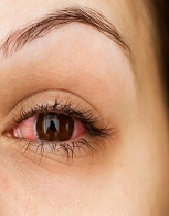Winter’s cold weather brings with it a range of health woes and dry, itchy eyes are among them. Dr. Marissa Locy, from the University of Alabama at Birmingham’s Department of Ophthalmology, explained that humidity generally drops in the winter as most people turn on the heat in their offices and homes to fight the cold temperatures.
The result is lower humidity outside and even lower humidity inside, leading to warm and very dry conditions that may cause moisture to evaporate from the eye faster than normal. This can cause the eyes to become dry and irritated.
Preventing Dry Eyes
So how do you protect your eyes from becoming dry and irritated during the winter months? Dr. Locy suggested using a humidifier to help restore humidity to the air and even moisture to the eye. Drinking lots of fluids to keep the body hydrated can also help keep moisture in the eyes.
Your eyes may also dry out when wearing contacts so Dr. Locy advised to always wear clean contacts to prevent itching and possible infection. Using eye protection and a hat with a visor can likewise protect the eyes from the extreme cold and wind outside.
Make sure you distance yourself from heat sources because they can be another cause of dry eyes. It may also help if you take a break from using electronic devices. Looking at the computer screen or your smartphone for an extended amount of time can cause you to blink less, which keeps your eyes from producing tears.
Treating Dry Eyes
There is no cure for dry eyes but Dr. Locy said that there are ways to relieve the symptoms, by using eye drops, ointments and medications, or plugging the tear ducts to slow down the drainage of tears from the surface of the eyes.
Dry eyes may also progress to dry eye disease, so it it is important to consult with a doctor if you experience prolonged signs of dry eyes, which include red, tired, painful and irritated eyes.
Other symptoms to watch out for include stinging and burning sensation in the eyes, sensitivity to light, the sensation of having something in the eyes, watery eyes, blurred vision and eye fatigue.
If you experience any of these symptoms, feel free to contact us here at See Island Eyecare and set an appointment with one of our eye specialists.


